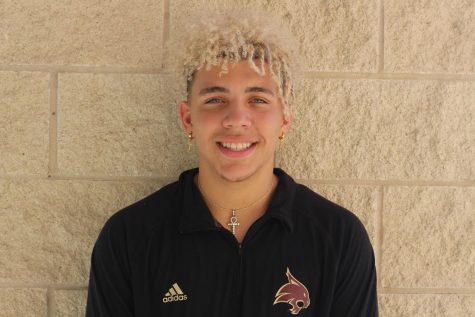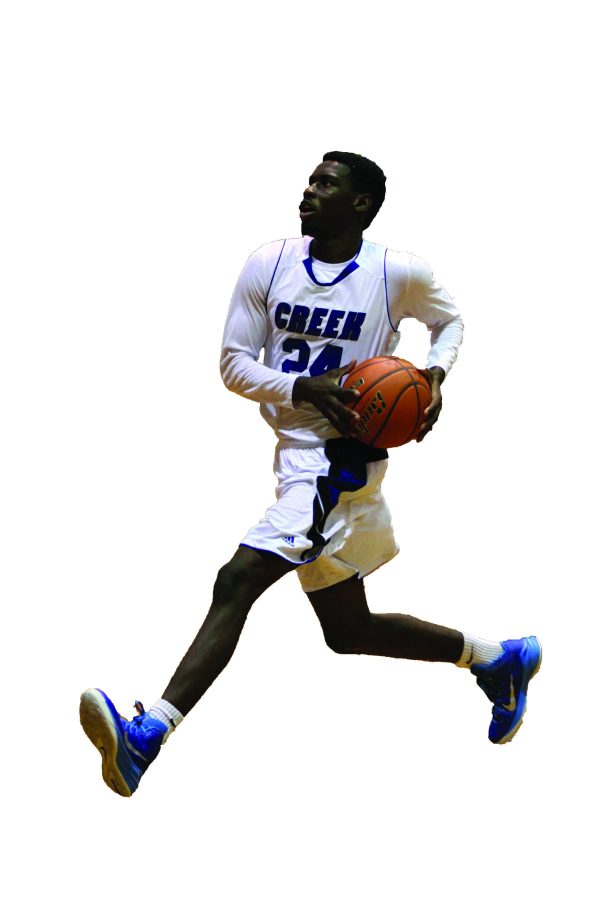Calling a technical on stress
Athletes balancing sports and school
Photo by: Hannah Felske
Junior Varsity forward Eric Harris, 11, strides for two easy points for the Cougar basketball team.
Athlete life is not easy.
Student athlete life is harder.
Student athletes not only have an expectation to hit that clutch three-pointer or catch the game-winning interception, but they also have to come in clutch in the gradebook. This new challenge combines stress from the free throw line and homework due the next day, and it can heavily impact a student’s performance in both areas.
Each role takes a great amount of time out of a student’s everyday life whether for practice, studying or, in some cases, leaving one for the other. Student athletes face many obstacles throughout the school year, resulting in stress, high expectations and in some cases, anxiety in many students. Constantly pushing win after win, student athletes can fall behind in school and may often miss classes because of their games and tournaments, like junior varsity basketball guard David Favorite.
“Most of the time, when I’m having more basketball, it’s affecting my schoolwork,” Favorite said.
The basketball players practice after school everyday for about an hour and a half depending on the coach’s schedule. However, the teams also have two games a week on Tuesdays and Fridays.
“It takes up about 16 hours a week with practice and games,” Favorite said. “Basketball has everything to do with my stress.”
Balancing school and sports might cause a student to get off of their daily routine, and too much of one topic can cause a decline in the other. Holding the responsibility of both an athlete and a student can cause unwanted stress in a teen’s life if they do not have proper time-management skills.
Sophomore guard Matthew Baham thinks responsibility holds importance when it comes to everyday life. However, this may cause days to transform into dull routines.
“When you’re a freshman, it’s all very new to you,” Baham said. “The more you get older and the more [you’re] experienced, it becomes easier to handle certain situations like, getting homework done.
According to a study done by the NCAA on the experiences of college athletes all around revealed that 60 percent of college athletes reported viewing themselves “more as athletes then students.” Unfortunately most go on to have a traditional career other than continuing to an athletic desire.
Another study done by the NCAA shows that nearly one in three adolescents qualifies for anxiety. Almost 85 percent of certified athletic trainers believe anxiety disorders are currently an issue in student-athletes on campuses all-around.
Students tend to have constant stress, following simple tips when dealing with a sport and school simultaneously can greatly reduce strain. A successful student athlete should have a daily routine they stick with in order to make daily life easier.
“I try to keep it as balanced as I can,” Baham said. “Because if I spend too much time on one thing, it will obviously drop in the other.”
Communication with teachers and coaches, letting them know about the multiple responsibilities, will reduce stress significantly. This will eventually benefit the student athlete during struggling times with handling both priorities.
‘’Our coaches motivate us to keep our grades up,” Baham said. “No pass, no play.”
Plan for success, but also have a plan B as well. Ensure the mind does not remain set on one thing, the case with anything in life.
“I think about the future me,” Baham said. “And I just do my self a favor now by working hard in everything I do.”

Kai Fortner Newby is a senior and the managing editor for the Cougar Connection. Kai enjoys photography, hanging with friends, and shopping.


